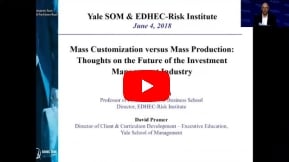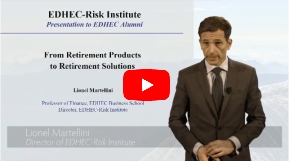|
December, 2018
|
|
|
|
Advances in Financial Technologies and Applications to Investment Solutions for Individuals
In early 2017, EDHEC-Risk Institute joined forces with KAIST, Princeton University and Tsinghua University to organise a prestigious rotating conference series on Financial Technologies. This collaboration resulted in the creation of a forum to facilitate discussion among all interested parties around the world. After successful events organised in Princeton in 2017 and Seoul in 2018, EDHEC-Risk Institute is pleased to be hosting the "Advances in Financial Technologies and Applications to Investment Solutions for Individuals" conference, which will be held in Paris on 2 April, 2019 at the Palais Brongniart – a flagship monument on Paris' historic landscape as it was the home of the French Stock Exchange for nearly two centuries. More...
|
|
Factor-Based Commodity Investing
Commodities represent a small but significant part of alternative assets in institutional investor portfolios. Commodity investors stress the low correlation between commodities and traditional investments (like equities and bonds) as well as the diversification benefits of including commodities in portfolios. They also view commodities as one of the few assets offering protection against rising inflation. The fall in commodity prices since the financial crisis of 2008 and the sharp fall of the S&P GSCI, the benchmark used by most institutional investors to evaluate commodity investments, raised questions about the long-term return potential of commodities and the role of commodities in strategic asset allocation. More...
|
|

|
|
|
Gamma Trading Skills in Hedge Funds, with Marie Lambert
This paper explores the gamma trading, timing and managerial skills of individual hedge funds across categories. Authors replicate the non-linear payoffs of hedge funds with traded options, with the option features being endogenously defined in their replication model. On top of providing a flexible tool to create individual benchmarks for the payoff curvature of hedge funds, the model helps to assign hedge fund styles into three categories: directional with market timing skills, non-directional and market timers. This research has an incremental potential to stimulate additional research in the field of hedge funds performance replication through passive strategies. More...
|
|
|
Are You Rich Enough for A (Single) Family Office, by Bernd Scherer
Are you rich enough for a family office? Focusing purely on the financial economics of a family office, the author derives the minimum assets under management compatible with the family office's investment management skills and costs versus the family benchmark alternative as well as its risk aversion. He finds that rules of thumb like "the minimum size for a family office is 100 million" can be grossly misleading. The analysis is equally applicable to deciding on the threshold size for in-house asset management. More...
|
|
|
A Reinterpretation of the Optimal Demand for Risky Assets in Fund Separation Theorems, with Lionel Martellini and Vincent Milhau
In this article, the authors introduce new expressions for the optimal portfolio in a multi-period model and propose a criterion to assess whether the introduction of a new asset in the investment universe adds to an investor's welfare. The first contribution of the paper is to provide a new way to compute the weight of an asset in each elementary portfolio, which turns out to clarify the economic intuition behind the composition of the portfolios: an asset is included in a portfolio if, and only if, this improves the criterion optimised by the portfolio. More...
|
|
|
Volatility smiles when information is lagged in prices, with Carlos Heitor Campani
This study explores volatility smiles when stock market information is lagged, specifically in the REIT industry. A usual requirement is that REITs can only disseminate information relating to their property valuations once per year; therefore, this leads to the lagging effect. Within the context of exchange options (i.e. mergers), it seems that no study has researched on this theme. This article uses the Black & Scholes model to calculate implied volatilities and their corresponding implied options to illustrate arbitrage opportunities when exchange options emerge. The results illustrate that implied volatilities are different from non-implied volatilities. More...
|
|
|
|
IPE EDHEC Research Insights Autumn 2018
The Autumn 2018 Scientific Beta special issue of the Research for Institutional Money Management supplement to Pensions & Investments first shows that achieving robust exposure to long-term rewarded factors, good diversification of unrewarded risks, and high levels of investability are key requirements for adding value with factor indices. It is clear that this added value is expressed over the long term, but that risk control options can increase the short-term consistency of the outperformance that investors expect. More...
|
|
Wheat Futures Contracts: Liquidity, Spreading Opportunities, and Fundamental Factors
How should fund managers choose amongst wheat futures contracts if they are interested in expressing bullish economic and inflationary views through positions in the agricultural futures complex? They should consider the various factors that drive the relative performance of different classes of wheat futures contracts, as briefly covered in this article. More...
|
|
|
Webinar: "Mass Customization Versus Mass Production in Investment Management" - Professor Lionel Martellini discusses with Yale SOM his white paper "Mass Customization versus Mass Production: How an Industrial Revolution is about to Take Place in Money Management and Why It Involves a Shift from Investment Products to Investment Solutions" and the impacts of the industry transformations that it highlights.
|
Webinar: "From Retirement Products to Retirement Solutions" - an application of Goal-Based Investing principles to a major goal for individual investors, namely retirement. Professor Lionel Martellini discusses the retirement problem and how to move away from retirement products, that may not be so useful at addressing the retirement needs of investors, towards meaningful retirement solutions. We need customised solutions meeting our particular needs.
|

|

|
|
Learn more in video by subscribing to our YouTube channel.
|
|
|
|
|
Nikos Tessaromatis presented his latest research on factor investing at the 8th Wealth Management Forum in Athens
Nikos Tessaromatis, Professor of Finance, EDHEC Business School and Member, EDHEC-Risk Institute, was invited to conduct a session on the theme "Factor investing – the next revolution in investment management" in Athens, on 29 November, 2018. The presentation discussed the benefits and opportunities that factor-based investing offers to both institutional and retail investors. More...
|
|
|
New session announced for the seminar on Harvesting Risk Premia in Alternative Asset Classes and Investment Strategies on March 25 - 27, 2019 on Yale campus
This seminar shows how to deal with non-Gaussian returns, illiquid assets, and flawed data. It also presents qualitative and quantitative techniques to control asset-class exposures and manage liquidity, valuation and counterparty risks for portfolio-wide decisions involving alternatives. More...
|
|
|
EDHEC Professor Frank J. Fabozzi appointed co-editor of a new journal: The Journal of Financial Data Science
Frank J. Fabozzi, Professor of Finance at EDHEC Business School, has been invited to serve as co-editor with Marcos Lopez de Prado (AQR Capital Management) and Joseph Simonian (Natixis Investment Managers) of The Journal of Financial Data Science, to be published by IPR Journals. The new journal will cover all topics in data science applied to finance, with emphasis on asset management and risk management: Big Data and Artificial Intelligence/Machine Learning. More...
|
|

|
|
EDHEC-Risk Institute has been cited widely in the business and industry press. A selection of articles may be found below.
"FIXED INCOME ETFS: Choosing your mood music", Funds Europe (06/12/2018) "Smart beta ETFs begin to impact on active funds", ETF Express (03/12/2018) "Price battle divides losers from winners", Financial Times (05/11/2018) "Smart beta moves into mainstream for large investors", Financial Times (05/11/2018) "Global debt pile creates new chances in nascent market", Financial Times (05/11/2018) "Investors call for new products and more innovation in ethical / SRI ETFs", ETF Strategy (01/11/2018) "A Nice, un laboratoire à la pointe de la recherche sur le risque financier", Le Monde (31/10/2018) "Les écoles de commerce se disputent les gloires de la recherche", Le Monde (28/10/2018) " Investors hunger for smart beta fixed income: EdHEC", ETF Stream (24/10/2018) "ETF investors bemoan lack of research for fixed income smart-beta strategies", Investment Week (22/10/2018) "Swiss Life Asset Managers France And EDHEC-Risk Set Up A Research Chair To Analyse The Role Of Real Estate In Investment Solutions", Mondovisione (17/10/2018) "For those with a real focus on retirement income solutions", Kiwi Investor (11/10/2018) "Target-date retirement funds miss the mark", Money Week (05/10/2018)
|
|
Stay tuned for more research, outreach, education and industry partnership developments on investment solutions for institutions or individuals
 |
|
About EDHEC-Risk Institute:
Part of EDHEC Business School and established in 2001, EDHEC-Risk Institute has become the premier academic centre for industry-relevant financial research. In partnership with large financial institutions, its team of permanent professors, engineers, and support staff, and research associates and affiliate professors, implements seven research programmes and six research, industrial partnerships and private research projects focusing on asset allocation and risk management. Additionally, it has developed an ambitious portfolio of research and educational initiatives in the domain of investment solutions for institutional and individual investors. As part of its "Make an Impact" signature, EDHEC-Risk plays a noted role in furthering applied financial research and systematically highlighting its practical uses.
EDHEC-Risk Institute
393 Promenade des Anglais, BP 3116,
06202 Nice Cedex 3, France
E-mail: [email protected]
Telephone: +33 493 187 887
Web: https://risk.edhec.edu
|
Subscription Options:
You have received this e-mail as a financial professional listed in our database, or because you have agreed to receive communications from us.
Please consult our Privacy Notice for more information.
* If you no longer wish to receive information from EDHEC-Risk Institute at this address (%%Email%%), please reply here.
* If you wish to update your contact details, please reply here.
To ensure that you continue
to receive e-mails from EDHEC-Risk Institute, please add our organisation to your "Safe Senders" list.
|
|